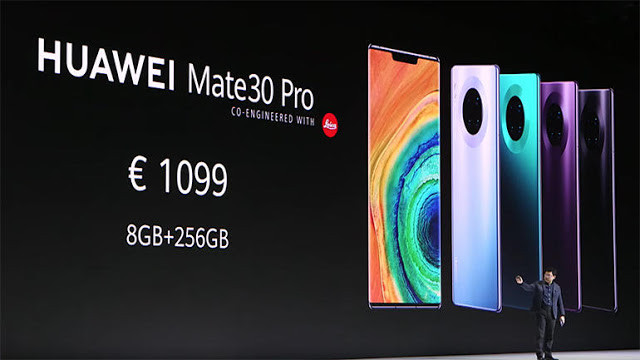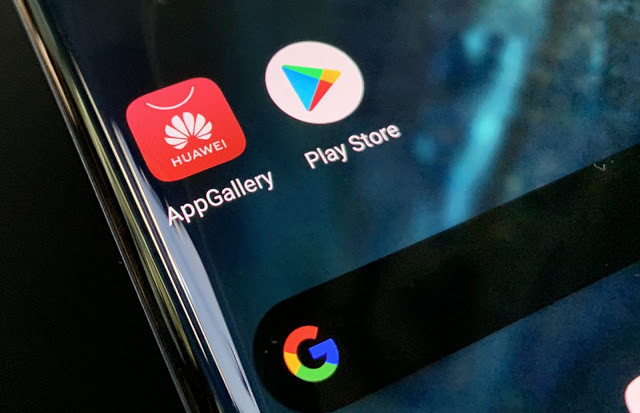
Huawei Moving on Without Google?
October 17, 2019October 17, 2019 (Gunnar Ulson - NEO) - Huawei's flagship smartphone, the Mate 30 and Mate 30 Pro, launched without Google products being available on it due to US restrictions against Chinese companies (and specifically against Huawei itself).
Contrary to what many have speculated, Huawei has not developed its "own operating system" for its phones but is instead simply using an open source version of Google's Android. This means that Android applications will still be available to Huawei users and they will still use their phones as normal, but they will have to acquire applications through Huawei's AppGallery rather than through Google Play.
CNET in a recent article titled, "Huawei Mate 30 Pro ditches Google Apps, keeps Android. Why it matters," would explain:
Will users buy a phone they cannot use Google's seemingly ubiquitous services on? Tech publications across the Western World have been pondering this question as well as Huawei's future prospects in light of US restrictions and the looming trade war.
In a wider context, how will this seemingly pivotal moment for Huawei impact its global market share or that of Chinese businesses in general?
Leaving Google Behind
Executive Director and CEO of Huawei Business Group, Richard Yu, has stated that Huawei and Google have a strong partnership and that the current and growing complications Huawei faces is a direct result of the US government's doing, Forbes would report.
It is obvious that for Huawei continuing to use Google's Android operating system on its phones and being able to work with Google would be most beneficial for the company at least in the short term. In the long term Huawei may eventually be poised to compete directly with Google or eventually overtake it with its own version of popular Google products.
Many analysts seem to believe this is the impetus driving US restrictions in the first place; American firms being unable to compete head-to-head with their Chinese counterparts and the US using its still potent economic primacy to sabotage China's economic ascension (and that of specific Chinese firms) for as long as possible.
No matter what Huawei's executives really think about Google or Google of them, it appears inevitable that Huawei will at the very least be positioned in the near future to challenge Google's control over Android as well as its primacy over e-mail, map applications and other features the global public have until now turned to Google for.
The US, by restricting Huawei's access to Google services, seems to have only hastened that day, forcing the Chinese tech giant to rapidly invest in, develop and promote alternatives. Whatever shortcomings its own version of Android may face in the short term, Huawei certainly has the resources to hire the developers required to create their own security updates and hardware support in the near future.
Separately, Huawei's 5G technology is already being widely adopted by nations around the globe who have ignored US pressure to adopt boycotts against Chinese companies and Huawei in particular. Huawei's smartphones have also already worked their way deeply into markets around the globe and gained popularity that will not simply evaporate overnight.
The current setback imposed by the US government will only delay the inevitable, and possibly prove an eventual self-inflicted, fatal blow to US tech companies like Google.
China = US + 1 Billion
US restrictions don't affect Huawei handsets sold within China. Chinese consumers also have not widely adopted Google services with domestic Chinese companies providing everything from online search engines and e-mail solutions to social media networks and media sharing platforms.
Huawei is likely to be able to survive until it can compensate for and eventually overcome US restrictions on its products abroad.
The population of China, for those who are unaware, is that of the United States plus an extra one billion.
Chinese President Xi Jinping once said, "the Chinese economy is a sea, not a pond. Storms can overturn a pond, but never a sea."
This sentiment aptly applies to Huawei's current challenges. US efforts to damage Huawei's sales globally will only have a limited impact and only in the short term. Huawei will survive and thrive within the "sea" of China's own immense domestic markets. It will adapt and evolve before reemerging globally able to circumvent US restrictions with a host of alternatives that will directly compete against Google.
The ability to circumvent US restrictions will be an attractive option for virtually all major non-US smartphone manufacturers (and likely firms from other industries as well) who can probably easily imagine themselves one day ending up in Huawei's shoes. Adopting an operating system, application store and services independent of US tech giants will not only prevent these businesses from being attacked by US trade practices in the future, but also help share the wealth Google and other US tech giants have horded for years.
The US may have bitten off more than it could chew in its trade war with China. Its instinct to crush rivals by any means necessary may have blinded the US from the necessity to gracefully adjust to a changing global economy where its primacy is simply no longer logical or sustainable.
The restrictions placed on Huawei are meant to give US-based firms an advantage and an opportunity to reassert themselves across global markets Huawei was moving in on. In reality, these restrictions have only delayed Huawei's and other firms' inevitable surpassing of US corporations.
Not only will Huawei and others still overtake US corporations, but because of the US' trade practices, these companies will be hesitant to work with US firms in any significant way again.
Thus, the US has forfeited an opportunity to influence the future shape of the global economy and instead illustrated the need to uproot and replace US monopolies including over the Android operating system and the many popular applications running on it.
The US' attack on Huawei ultimately isn't a demonstration of American strength. Instead, it illustrates the inability of US firms to compete directly with foreign rivals now rising upon the global stage. It also illustrates the threat of US trade practices that could eventually end up targeting other firms.
As Huawei invests heavily in its online application store (its alternative to Google Play) and in hardware including processors for its smartphones, the ability for US restrictions to impact Huawei will diminish.
Anything short of Huawei going out of business will not prevent it from springing back with a vengeance against this current round of US restrictions.
The most unfortunate aspect of this is that a wedge has been spitefully driven between the large pools of talent drawn together by Google and Huawei respectively. What could have been lucrative cooperation for both corporations has become instead a coercive, ugly struggle that will set both companies back. Beyond Google, this ongoing chapter of the US-China trade war will poison trust between the United States and foreign firms seeking to do business with their American counterparts.
In the long run this spat, however severe and disruptive, may have an ultimately positive impact. Corporations realizing they cannot allow monopolies over essential services or components they depend on will ensure a more localized focus on self-sufficiency that will contribute to economic stability not only for respective national economies but for the individuals and businesses who find themselves otherwise impacted by disruptive trade wars like the one we see today.
Ulson Gunnar, a New York-based geopolitical analyst and writer especially for the online magazine “New Eastern Outlook”.
Contrary to what many have speculated, Huawei has not developed its "own operating system" for its phones but is instead simply using an open source version of Google's Android. This means that Android applications will still be available to Huawei users and they will still use their phones as normal, but they will have to acquire applications through Huawei's AppGallery rather than through Google Play.
CNET in a recent article titled, "Huawei Mate 30 Pro ditches Google Apps, keeps Android. Why it matters," would explain:
The phones will ship with state-of-the-art hardware, including four rear cameras, but without full Android support. The Mate 30 phones are based on Android open source, meaning they will still function like Androids. What they won't have, though, is Google services or apps. No Google Maps, no Google Chrome and, most importantly, no Google Play Store.Huawei's latest phone is expected to sell well within China's domestic markets but its future beyond Chinese borders is in question.
Instead, you'll surf the web through the Huawei Browser and download apps through the Huawei AppGallery. The AppGallery has around 45,000 apps, according to Huawei, compared to the Google Play Store's estimated 2.7 million. Google typically licenses the latest version of Android, currently Android 10, for phone manufacturers to use. The Mate 30 phones will instead be powered by open-source Android and run EMUI 10, Huawei's user interface that approximates Google's Android 10.
Will users buy a phone they cannot use Google's seemingly ubiquitous services on? Tech publications across the Western World have been pondering this question as well as Huawei's future prospects in light of US restrictions and the looming trade war.
In a wider context, how will this seemingly pivotal moment for Huawei impact its global market share or that of Chinese businesses in general?
Leaving Google Behind
Executive Director and CEO of Huawei Business Group, Richard Yu, has stated that Huawei and Google have a strong partnership and that the current and growing complications Huawei faces is a direct result of the US government's doing, Forbes would report.
It is obvious that for Huawei continuing to use Google's Android operating system on its phones and being able to work with Google would be most beneficial for the company at least in the short term. In the long term Huawei may eventually be poised to compete directly with Google or eventually overtake it with its own version of popular Google products.
Many analysts seem to believe this is the impetus driving US restrictions in the first place; American firms being unable to compete head-to-head with their Chinese counterparts and the US using its still potent economic primacy to sabotage China's economic ascension (and that of specific Chinese firms) for as long as possible.
No matter what Huawei's executives really think about Google or Google of them, it appears inevitable that Huawei will at the very least be positioned in the near future to challenge Google's control over Android as well as its primacy over e-mail, map applications and other features the global public have until now turned to Google for.
The US, by restricting Huawei's access to Google services, seems to have only hastened that day, forcing the Chinese tech giant to rapidly invest in, develop and promote alternatives. Whatever shortcomings its own version of Android may face in the short term, Huawei certainly has the resources to hire the developers required to create their own security updates and hardware support in the near future.
Separately, Huawei's 5G technology is already being widely adopted by nations around the globe who have ignored US pressure to adopt boycotts against Chinese companies and Huawei in particular. Huawei's smartphones have also already worked their way deeply into markets around the globe and gained popularity that will not simply evaporate overnight.
The current setback imposed by the US government will only delay the inevitable, and possibly prove an eventual self-inflicted, fatal blow to US tech companies like Google.
China = US + 1 Billion
US restrictions don't affect Huawei handsets sold within China. Chinese consumers also have not widely adopted Google services with domestic Chinese companies providing everything from online search engines and e-mail solutions to social media networks and media sharing platforms.
Huawei is likely to be able to survive until it can compensate for and eventually overcome US restrictions on its products abroad.
The population of China, for those who are unaware, is that of the United States plus an extra one billion.
Chinese President Xi Jinping once said, "the Chinese economy is a sea, not a pond. Storms can overturn a pond, but never a sea."
This sentiment aptly applies to Huawei's current challenges. US efforts to damage Huawei's sales globally will only have a limited impact and only in the short term. Huawei will survive and thrive within the "sea" of China's own immense domestic markets. It will adapt and evolve before reemerging globally able to circumvent US restrictions with a host of alternatives that will directly compete against Google.
The ability to circumvent US restrictions will be an attractive option for virtually all major non-US smartphone manufacturers (and likely firms from other industries as well) who can probably easily imagine themselves one day ending up in Huawei's shoes. Adopting an operating system, application store and services independent of US tech giants will not only prevent these businesses from being attacked by US trade practices in the future, but also help share the wealth Google and other US tech giants have horded for years.
The US may have bitten off more than it could chew in its trade war with China. Its instinct to crush rivals by any means necessary may have blinded the US from the necessity to gracefully adjust to a changing global economy where its primacy is simply no longer logical or sustainable.
The restrictions placed on Huawei are meant to give US-based firms an advantage and an opportunity to reassert themselves across global markets Huawei was moving in on. In reality, these restrictions have only delayed Huawei's and other firms' inevitable surpassing of US corporations.
Not only will Huawei and others still overtake US corporations, but because of the US' trade practices, these companies will be hesitant to work with US firms in any significant way again.
Thus, the US has forfeited an opportunity to influence the future shape of the global economy and instead illustrated the need to uproot and replace US monopolies including over the Android operating system and the many popular applications running on it.
The US' attack on Huawei ultimately isn't a demonstration of American strength. Instead, it illustrates the inability of US firms to compete directly with foreign rivals now rising upon the global stage. It also illustrates the threat of US trade practices that could eventually end up targeting other firms.
As Huawei invests heavily in its online application store (its alternative to Google Play) and in hardware including processors for its smartphones, the ability for US restrictions to impact Huawei will diminish.
Anything short of Huawei going out of business will not prevent it from springing back with a vengeance against this current round of US restrictions.
The most unfortunate aspect of this is that a wedge has been spitefully driven between the large pools of talent drawn together by Google and Huawei respectively. What could have been lucrative cooperation for both corporations has become instead a coercive, ugly struggle that will set both companies back. Beyond Google, this ongoing chapter of the US-China trade war will poison trust between the United States and foreign firms seeking to do business with their American counterparts.
In the long run this spat, however severe and disruptive, may have an ultimately positive impact. Corporations realizing they cannot allow monopolies over essential services or components they depend on will ensure a more localized focus on self-sufficiency that will contribute to economic stability not only for respective national economies but for the individuals and businesses who find themselves otherwise impacted by disruptive trade wars like the one we see today.
Ulson Gunnar, a New York-based geopolitical analyst and writer especially for the online magazine “New Eastern Outlook”.



